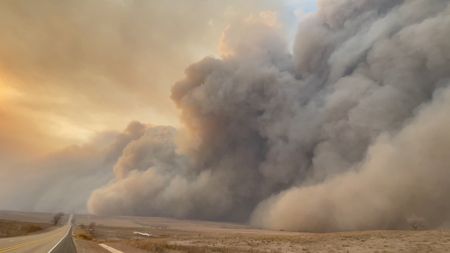By Laila Kearney
(Reuters) -Electric utility Xcel Energy said on Thursday its facilities likely started the Smokehouse Creek fire, which has destroyed dozens of homes and charred sprawling cattle ranches in the largest wildfire in recorded Texas history.
“Based on currently available information, Xcel Energy acknowledges that its facilities appear to have been involved in an ignition of the Smokehouse Creek fire,” Xcel Energy wrote in a statement.
The Minneapolis-based utility, which provides power and natural gas to parts of Texas and seven other U.S. states, disputed “claims that it acted negligently in maintaining and operating its infrastructure.”
Xcel faces at least two lawsuits claiming the company negligently failed to properly maintain electrical infrastructure linked to the blaze.
The Smokehouse Fire, which has burned over 1 million acres since erupting in the Texas Panhandle last month, has been connected to two deaths. At least 64 homes were destroyed in the fire, Xcel said in a statement, in which it encouraged people with property or livestock lost in the blaze to submit claims directly to the utility.
The company said a second Texas fire, dubbed the Windy Deuce, did not appear to have been started by its infrastructure.
Last Friday, a Texas homeowner who said their home was burned in the Smokehouse fire sued Xcel, claiming that a power pole owned by the company’s subsidiary was in poor condition before it fell and sparked the fire.
A second lawsuit filed on Wednesday on behalf of a North Texas ranch likewise claimed that Xcel had a duty to maintain safe electrical equipment, but negligently failed to properly repair and inspect its power line poles, leading to the Smokehouse fire. The lawsuit said the fire killed cattle and damaged buildings on the ranch, among other harms.
Xcel also faces hundreds of lawsuits in Colorado, where the costliest wildfire on record in the state, the Marshall Fire, had killed two people and destroyed nearly 1,100 homes in December 2021. The company denies its power lines were to blame.
(Reporting by Laila Kearney and Clark Mindock in New York and Seher Dareen in Bengaluru; Editing by Shilpi Majumdar, Liz Hampton, Franklin Paul and David Gregorio)

